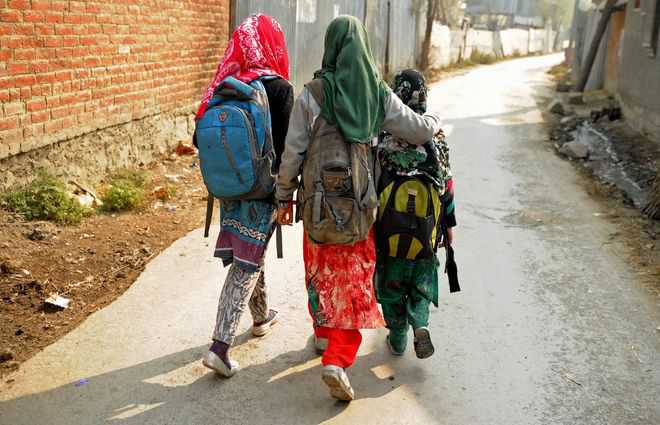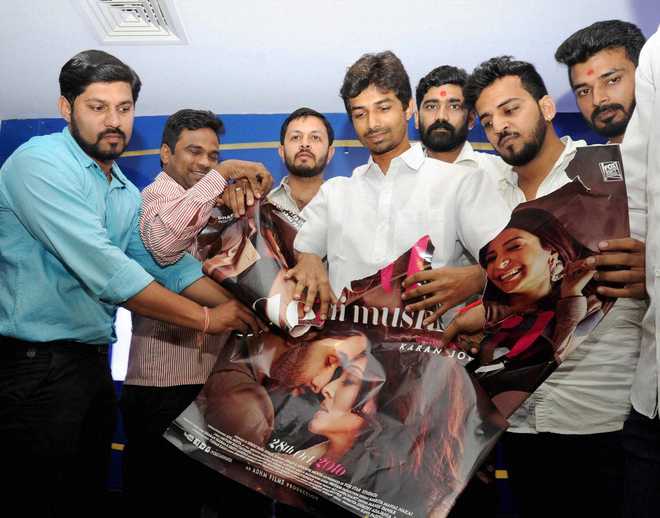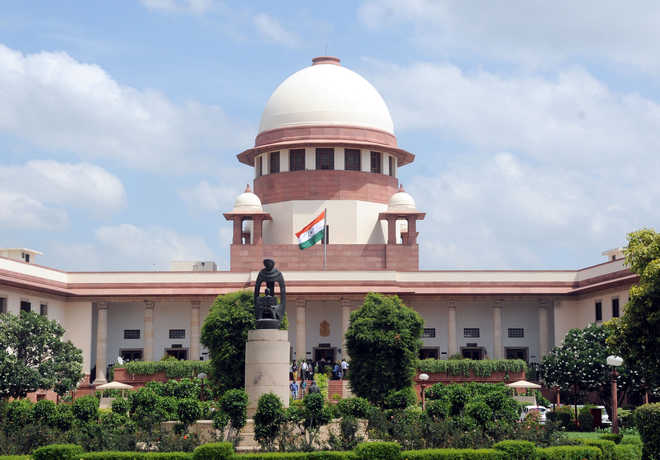 PILs seek quashing of the government”s decision.
PILs seek quashing of the government”s decision.New Delhi, November 14 Amidst unprecedented panic rush in banks and ATMs across the country, the Supreme Court would hear on Tuesday a batch of PILs seeking quashing of the government’s decision to demonetise Rs 1,000 and Rs 500 currency notes on the grounds that it infringed citizens’ right to life and trade among others.A bench comprising Chief Justice T S Thakur and Justice D Y Chandrachud has listed for hearing as many as four pleas against the November 8 decision of the Narendra Modi government that these notes are no longer a legal tender.(Follow The Tribune on Facebook; and Twitter @thetribunechd)Out of the four, two PILs have been filed by Delhi-based lawyers Vivek Narayan Sharma and Sangam Lal Pandey, respectively. Two other pleas have been filed by individuals, S Muthukumar and Adil Alvi, on the demonetisation issue.The apex court, on November 10, had agreed to hear the pleas on Tuesday.The petitioners have alleged that the sudden decision has created chaos and harassment to public at large and the notification of the Department of Economic Affairs, Ministry of Finance be either quashed or deferred for some time.The Centre has also filed a caveat in the registry saying it should be heard if the bench agrees to hear and pass orders on any such plea.Sharma, in his plea, has termed the notification of DEA as “dictatorial”, claiming that it did not grant reasonable time to citizens for exchanging the specified bank notes to legitimate notes to avoid “large scale mayhem, life threatening difficulties”.The plea has sought either quashing of the notification or a direction to the Centre for grant of “reasonable time frame” to citizens to exchange the demonetised currency notes to avoid difficulties being faced by the people. — PTI
Task force set up to expedite recalibration of ATMs
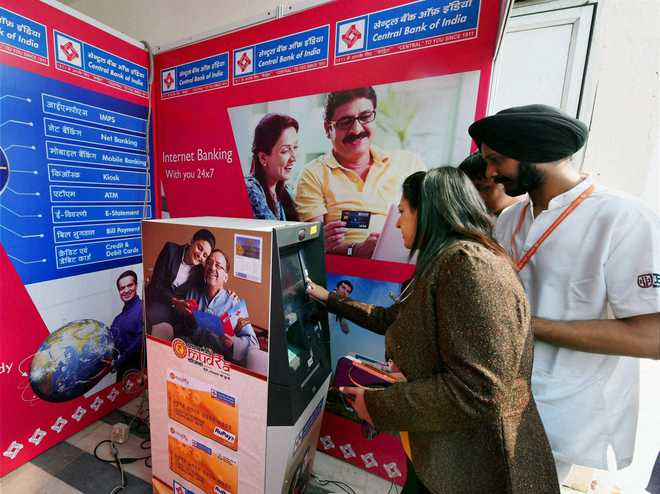 People try to withdraw cash from an ATM in New Delhi on Monday. PTI
People try to withdraw cash from an ATM in New Delhi on Monday. PTINew Delhi, November 14 The government has set up a task force under the chairmanship of RBI Deputy Governor S S Mundra to ensure that ATMs across the country are ready to dispense higher denomination notes in the shortest time.”The number of ATMs which will be recalibrated and which can dispense Rs 2,000 notes will be stepped up…To make this whole process faster, to expedite this whole process, a task force was decided to be set up under the chairmanship of Deputy Governor,” Economic Affairs Secretary Shaktikanta Das said.The team has been mandated with working closely with banks and various agencies involved in disbursement of cash and recalibration of hardware and software of the ATM network, he said.”The task force would ensure that ATM network is activated in the quickest time,” he said, adding that it will have its first meeting either today or tomorrow.The eight-member task force, which will have officials from Finance Ministry, Home Ministry and banks, has been mandated to chalk out a strategy for expeditious reactivation of all ATMs. Besides, the panel will have members from National Payments Corporation of India (NPCI), Chief General Manager of Department of Payment and Settlement Systems (DPSS) and Department of Currency Management of RBI.A representative each of ATM OEMs, Managed Service Providers, cash in transit (CIT) companies and white label ATM (WLA) operators will be invited to the deliberations of the task force. It may also invite others, if needed.Recalibration of ATMs involves multiple agencies — banks, ATM manufacturers, NPCI, switch operators, among others — making it a complex operation requiring immense coordination, RBI said in a statement.Rituraj Sinha, president, Cash Logistics Association of India, said, “It gives us a great deal of encouragement to work even harder after the Finance Ministry has taken cognisance of our recommendation to set up an ATM task force.” “In a meeting yesterday, we discussed specific methods to ease bottlenecks in the system as we are facing a logistics problem,” he added.There are about 2 lakh ATMs in the country and it has become necessary to recalibrate all cash handling machines to dispense the new design high security notes of Rs 500 and Rs 2,000 denomination. — PTI
AND THE AFTER-EFFECTS…
Marriage season hit hard
New Delhi: With demonetisation leading to temporary cash crunch, the big fat Indian wedding season has turned into a nightmare for both traders and families. “Should I first pay the tentwallah or the jeweller? I go through dilemmas like this everyday. Thanks to the government’s decision to ban Rs 500 and 1,000 notes, I don’t have enough cash to pay people,” says Rajinder Gupta, whose daughter is getting married on November 24. Though supporting the government move, he says it’s “ill-planned” and “badly timed”. Ranging from Rs 5,000 to as high as Rs 51,000, different wedding bands have offered their customers a one-month timeline for the full payment. But people are not even in the position to pay the advance. PTIAllow banks to hire ex-staff: AssochamNew Delhi: The government should allow banks to hire retired bank employees on a massive scale for speedy currency swap and cash withdrawal in the wake of demonetisation move, industry body Assocham said. “Just like General Election when staff across different departments is mobilised; different types of staff can be used for helping the over-stretched banks, grappling with the huge task of dealing with the demonetised currency notes of Rs 500 and Rs 1,000 and dispensing the new notes,” it said in an appeal to the PM. It also advised employing retired staff on short-term contract. SBI and some other banks have already roped in retired employees. “While preference can be given by banks to re-employ their own retired personnel, even cross-bank staff would be helpful,” Assocham Secretary General DS Rawat said. PTI
FinMin begins daily review
New Delhi: Keen to end the misery of millions of cash-starved citizens, the Finance Ministry on Monday began a daily review exercise to assess problem areas and put in place remedial measures. Nearly a week after the government withdrew Rs 500 and Rs 1,000 notes as part of a crackdown against black money and corruption, queues outside banks and ATMs have only got longer. Senior officials in the Finance Ministry have been allocated different states and banks to monitor currency supply situation and plan remedial actions quickly, official sources say. Shaktikanta Das, Secretary, Department of Economic Affairs, chaired a meeting of the Joint Secretaries tasked with currency management. PTIBanks ignored RBI order on Rs 100-ATMs?New Delhi: In anticipation of the huge demand for lower currency notes, ahead of the demonetisation move, the Reserve Bank of India had asked banks to set up ATMs that dispensed only Rs 100 notes. On November 2, six days before PM Modi announced that Rs 500 and Rs 1,000 notes would become illegal from midnight of November 8, the RBI had asked banks to recalibrate 10 per cent of its ATMs to exclusively dispense Rs 100 notes. How many banks complied with that directive is not known. However, the long queues at ATMs and the resultant chaos all across the country would imply that the directive may have been ignored. The RBI had also moved as early as May this year to provide incentive for setting up ATMs that dispensed only Rs 100 notes. In a circular on May 5, it promised to pay 50 per cent of the cost of such ATMs up to Rs 2 lakh. IANS

NOTE BAN: WHAT YOU NEED TO KNOW
Defunct currency valid for utility payment till Nov 24
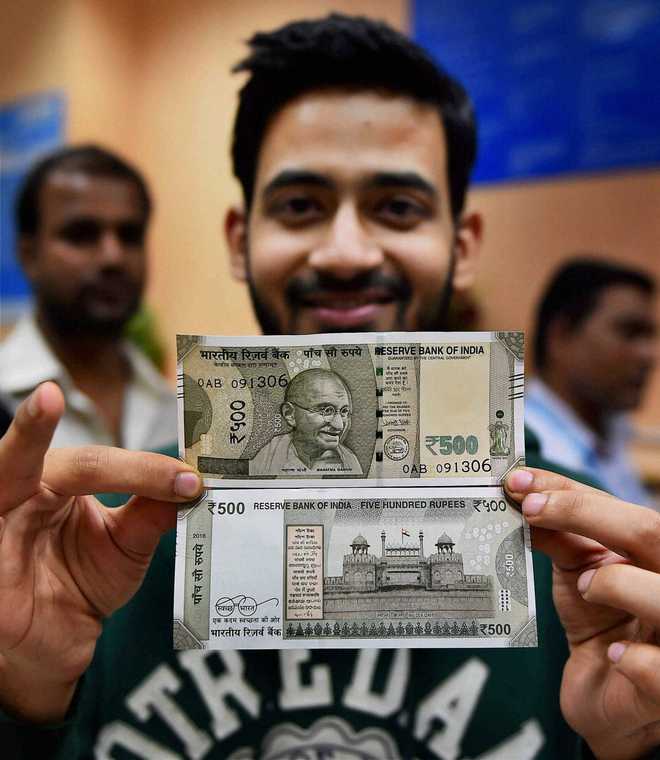
A youth shows new currency note of Rs 500 at a bank in New Delhi on Sunday. PTI photo
New Delhi/Mumbai, November 14
With banks struggling to cope with the rush to get alternative currency, the government has extended the use of old defunct Rs 500 and Rs 1,000 notes for paying household utility bills, fuel, taxes and fees and purchases from co-operative stores till November 24.The government also extended suspension of toll on National Highways across the country till midnight of November 18.While withdrawing Rs 500 and Rs 1,000 notes from the night of November 8-9, the government had allowed use of the old currency at government hospitals, railway ticketing, public transport, airline ticketing at airports, milk booths, crematoria/burial grounds and petrol pumps for 72 hours.(Follow The Tribune on Facebook; and Twitter @thetribunechd)This list was later expanded to include payments for metro rail tickets, highway and road toll, purchase of medicines on doctor prescription from the government and private pharmacies, LPG gas cylinders, railway catering, electricity and water bills and ASI monument entry tickets.(Read: Banks closed today; queues get longer outside ATM kiosks)As banks struggled to give alternate currency, the deadline was extended by another 72 hours. That deadline was to end at midnight tonight, but has now been extended till November 24, official sources said.
More relaxations
— Defunct Rs 500 and Rs 1,000 notes valid for paying household utility bills, fuel, taxes and fees till November 24.— No toll on National Highways across the country till midnight of November 18.— No parking charges at airports till November 21.— Banks to waive ATM charges on all transactions November 10 to December 30.Old currency can also be used for purchases at consumer co-operative stores like Kendriya Bhandar with valid ID proof as also for paying court fee.But payments towards utility bills will be restricted to only individuals or households for arrears and/or current bills. No advance payments will be allowed.Charges on ATM transactions waived till Dec 30In yet another move to lessen woes of people facing cash crunch, the RBI on Monday directed banks to waive ATM charges on all transactions done by savings bank customers till December 30.The waiver will be applicable on transactions done by a customer through his or her own bank ATM as well those of other banks.”It has been decided that banks shall waive levy of ATM charges for all transactions (inclusive of both financial and non-financial transactions) by savings bank customers done at their own banks’ ATMs as well as at other banks’ ATMs, irrespective of the number of transactions during the month,” the central bank said in a late evening notification.The waiver is applicable on transactions done at ATMs from November 10 till December 30, 2016.In August 2014, the number of mandatory free ATM transactions for savings bank account customers at other banks’ ATMs was reduced to three transactions per month in the six metro centres (Mumbai, New Delhi, Chennai, Kolkata, Bengaluru and Hyderabad).A customer was permitted at least five free transactions per month for use of own bank ATMs.Banks could charge up to Rs 20 (plus service tax, if any) beyond the permitted transactions.Parking charges at airports suspended till Nov 21The government also extended the suspension of vehicle parking charges at all airports till the midnight of November 21.According to the Ministry of Civil Aviation, the move to extend the suspension is expected to facilitate the smooth movement of passengers.Earlier on Monday, the government had extended the suspension of the fee collection at all the toll plazas on National Highways till November 18.Even the Indian Railways has said it will accept the demonetised currency notes as payment for ticketing and catering purposes till November 24. — Agencies
ATMs will start dispensing Rs 2k notes from today: Fin Min
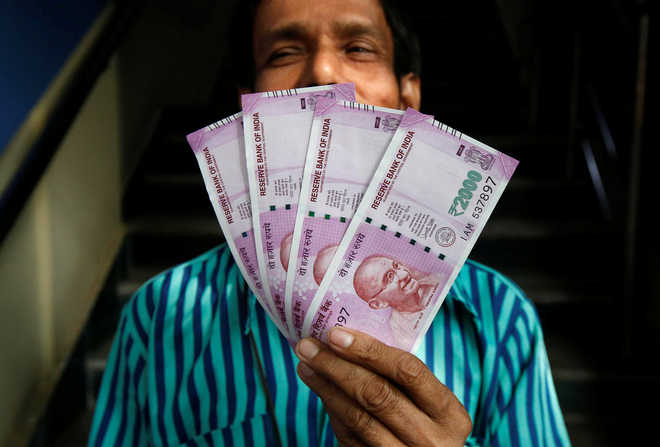
A man displays new 2000 Indian rupee banknotes after withdrawing them from a State Bank of India (SBI) branch in Kolkata. Reuters file photo
New Delhi, November 14
Allaying fears of shortage, the Finance Ministry on Monday said there is enough cash in the system and delivery channels are being augmented across the country to help cash-starved citizens.Giving details of the high-level meeting chaired by Prime Minister Narendra Modi late last night, Economic Affairs Secretary Shaktikanta Das said it was decided to activate all channels for dispensing cash.(Follow The Tribune on Facebook; and Twitter @thetribunechd)With regard to rural areas, he said the cash holding limit for 1.2 lakh banking correspondents (BCs) has been increased to Rs 50,000 and banks have been given flexibility to increase this limit on case to case basis.It has been also decided to provide cash multiple times to the BCs, so that rural population is served.Besides, supply of cash to 1.3 lakh branch post offices would be enhanced so that public can get banknotes.Together, these 2.5 lakh delivery points, mostly in rural areas, would be able to give bigger quantum of cash to the public, he added.For the urban population, Das said recalibration of ATMs has already started and they will start dispensing the new Rs 2,000 currency notes from today or tomorrow.However, he clarified that the higher cash withdrawal limit of Rs 2,500 is only for recalibrated ATMs.Additionally, a large number of micro-ATMs will be deployed to help people withdraw cash through debit cards.To mitigate their hardship, the RBI has started distributing high security Rs 500 notes from yesterday. — PTI



























































